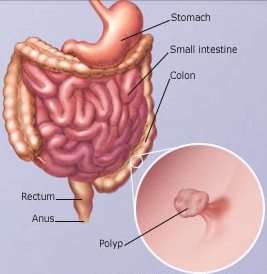Colon cancer is the third most commonly diagnosed cancer in the world, especially among the developed countries where food is readily available and affordable. Not too worry, however, colon cancer is treatable with good prognosis if detected early. Hence, let us take a closer look on what is colon cancer, how to identify risk factors, early signs and symptoms.

The colon is also known as the intestines, or bowels. Most colon cancer begins as a small lump in the intestine known as “polypâ€. Polyp is a non-cancerous growth that has the potential to develop into becoming cancerous. Unless the polyp grows into a large growth obstructing bowel movement, it usually does not cause any symptoms. One will not know that he or she has a polyp in their intestine unless a colonoscopy is done.
Who are at risk of developing colon cancer?
- Age – if you are 50 years old or older, you may be stand higher chance of developing colon cancer. While it is uncommon for diagnosis at the age before 50, those with positive family history are probable to develop the disease at a younger age

- Family history – if your parents, siblings or less commonly, relatives who are diagnosed to have colon cancer before, you are at greater risk of inheriting colon cancer as well
- Previous personal history of cancer – if you yourself have had been diagnosed to have any kind of cancer before, including colon cancer previously, there is possibility of developing this disease, again
- Inflammatory Bowel Diseases – Crohn’s disease and Ulcerative
 Colitis are intestinal disorders that cause inflammation and ulcers in the bowels, resulting in high turnover rate of intestinal cells and thus the higher probability of development into colon cancer
Colitis are intestinal disorders that cause inflammation and ulcers in the bowels, resulting in high turnover rate of intestinal cells and thus the higher probability of development into colon cancer - History of polyp – if you had done a colonoscopy before, perhaps during a full medical check-up, and polyp was found in your intestine, it might be a weak indication that chances of developing colon cancer is present
- Alcohol – if you have been a heavy drinker, be it beer or liquor, it is
 time to cut down to ease on the bowel
time to cut down to ease on the bowel - Smoking – this has been a known risk factor for many other diseases, colon cancer is not exceptional
- Obesity – it is found that many people who are obese, i.e BMI more than 25kg/m2, chances of dying from colon cancer is higher compared to those of normal weight
- Bad diet –high fat and low fiber diets are harmful to the colon.  Nonetheless, too much of fiber is also not a good indicator as it can cause constipation. Hence, a moderate diet of wide range of nutrition is advocated. Fiber MUST be taken with plenty of water as it is not an absorbable ingredient, i.e. it does NOT provide nutrition to your body, but together with water, it helps in easing the bowel movement.
What are the signs and symptoms?
Usually, patients will only seek medical help when there is something wrong with their body, especially when the normal routine becomes abnormal. In colon cancer, it is often asymptomatic until a later stage when the tumor is affecting bowel movement and the patient begins to worry. Commonly, the patients will present to the doctor with the following signs and symptoms:
- Rectal bleeding – blood is noticed in the toilet bowl mixing with the stools before flushing or staining on the tissue paper when wiping is done
 Change in character of stools – normal stools are soft and dark brown in color and of a substantial bulk in size. If stools become thin, bloody, smashed up or anything that you think it seems abnormal from your normal stool, do consult a doctor soon.
Change in character of stools – normal stools are soft and dark brown in color and of a substantial bulk in size. If stools become thin, bloody, smashed up or anything that you think it seems abnormal from your normal stool, do consult a doctor soon.- Change in bowel habit – one may either start to constipate or having watery diarrhea for days, feeling of incomplete bowel emptying, a.k.a tenesmus. Either way, there will usually be an inconsistent change in bowel habit compared to your usual routine.
- Frequent abdominal discomfort – this may include pain, bloatedness, nausea or vomiting
 Loss of appetite and weight – as a result of cancer, one may not feel like having food intake and food is not optimally absorbed into the body. This results in sudden substantial weight loss within a short period of time
Loss of appetite and weight – as a result of cancer, one may not feel like having food intake and food is not optimally absorbed into the body. This results in sudden substantial weight loss within a short period of time- Anemia – your family or friends might start to notice that you have look paler than before. Look at your palms, tongue and subconjunctiva, i.e. inside of the lower eye lids,
 it should normally look pinkish. If it looks white compared to your friends’ or family’s, it usually indicates that you are losing blood and you should see your physician for further check up
it should normally look pinkish. If it looks white compared to your friends’ or family’s, it usually indicates that you are losing blood and you should see your physician for further check up
As mentioned, colon cancer usually does not present with symptoms in the early stage. Nonetheless, it is important to identify the risk factors and common sign and symptoms early enough to seek medical attention so that it is not taken for granted. Hence, remember to LOOK BEFORE YOU FLUSH!
